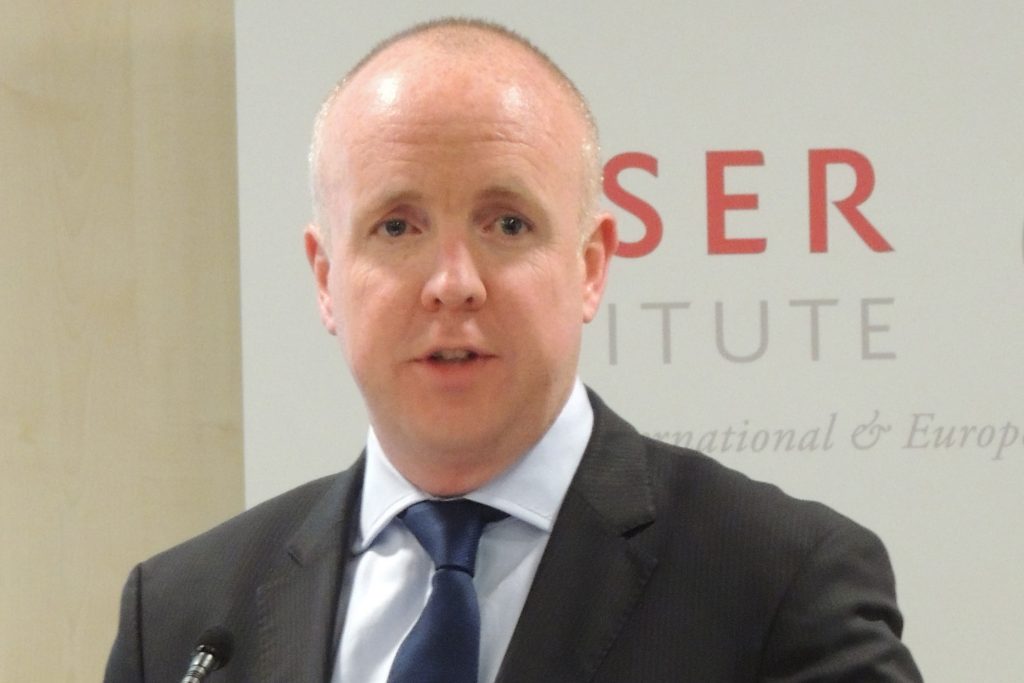Faces conveying joy and admiration filled the computer screen as attendees began entering the virtual space April 15 for the annual Owen M. Kupferschmid Memorial Lecture hosted by the BC Law’s Holocaust/Human Rights Project (HHRP). In impromptu fashion, those who were close to Kupferschmid started exchanging stories and expressing their gratitude for the opportunity to continue to honor the life and legacy of the cherished alumnus.
William Mandell ’86, a close friend of Kupferschmid and, like him, a founding member of the HHRP, opened with a brief history of his colleague’s accomplishments. Kupferschmid’s graduation from BC Law in 1986 was two years later than he had expected because, in the heat of earning his law degree, Kupferschmid took a leave of absence to travel to Nepal to help write the country’s first constitution.
After returning home, Kupferschmid sought a way for BC Law students to proactively use domestic and international law to seek legal accountability for war crimes, genocide, and crimes against humanity, said Mandell. The result was the founding of the Holocaust Human Rights Research Project, later renamed HHRP.
Mandell described two core principles Kupferschmid established for the project.
The first was based on a question: “How can law students be serious about studying and advancing the cause of the rule of law if they do not take action…to hold accountable those responsible for the most heinous acts of mankind?”
Second: “The question of accountability for former Nazi persecutors was not just an issue for the victims’ communities, but was also an issue of universal application relevant to all international domestic law and to the moral state of our planet.”
“In his tragically short 33 years of life, Owen left the project as his legacy and it’s been a living, evolving initiative that every year has drawn Boston College Law students to continue the project’s work through study, writing, practical experiences, informational programs, and advocacy,” said Mandell.
Hon. Phillip Weiner ’80, who has had long career as a prosecutor, judge, and trainer in international courts and tribunals from The Hague to Cambodia, introduced the featured speaker, Fergal Gaynor (above), who went on to discuss the future of international human rights law.
Few people possess Gaynor’s experience in handling war crimes cases. He began working on international criminal justice in 2001, serving on the teams that prosecuted leading members of the Bosnian Serb leadership, the Khmer Rouge leadership, and the Interim Government of Rwanda.
“I want to speak today about the importance of international atrocity trials as a means of combating revisionism and contributing to an accurate record of atrocities,” Gaynor said.
“What do we mean by the truth?” he asked, answering part of his own question with a statement made by US Ambassador Madeleine Albright to the UN Security Council in 1993. “Truth is the cornerstone of the rule of law, and it will point towards individuals—not peoples—as perpetrators of war crimes.” she said. “And it is only the truth that can cleanse the ethnic and religious hatreds and begin the healing process.”
Gaynor said the search for the truth raises a “philosophical fault line,” which separates the inquisitorial and adversarial criminal justice systems. The purpose of the former is to get as close to the truth as possible, he explained. The latter is more oriented to ensuring that the evidence submitted by the parties conforms to rules designed to preserve the fairness of the trial and to prevent a jury from seeing evidence that could result in an unfair conviction. The purpose and result of an Anglo-American, party-driven adversarial trial is not the “real truth” but the “trial truth,” he argued.
“Let’s reflect on the rights of the victims,” Gaynor continued. “There is an emerging acceptance of the right of victims to know the fate of relatives who have disappeared under oppressive dictatorships, and of a broader right of survivors to know the truth about the crimes committed against them and the identities of those most responsible.”
International courts’ responsibility is to ensure that their contribution to the collective memory of atrocity is objective, clear and accessible. “Forgetting means that victims are murdered twice, first when they are exterminated physically and thereafter when they are forgotten,” he said, citing the president of the ICTY.
Still, limitations remain and, according to Gaynor, include temporal and territorial jurisdiction, prosecutorial discretion, indictment, confidentiality, state-to-state information sharing, and plea agreement procedures. These limitations often result in the omission of historically relevant evidence for mundane reasons or lack of legal relevance. “Evidence is the basis of justice; to exclude evidence is to exclude justice,” Gaynor said.
In closing, he beseeched judges and practitioners to strive to ensure that judgments and briefs are cogent, readable, and enlightening. “All of us must do more to support international criminal justice processes. The greatest respect we can show to victims of atrocities is to support the rule of the law and to allow the truth to emerge in dignified processes,” Gaynor said.
To which Owen Kupferschmid’s mother, Gene, who was in the audience, responded, “Keep up the good work.”


